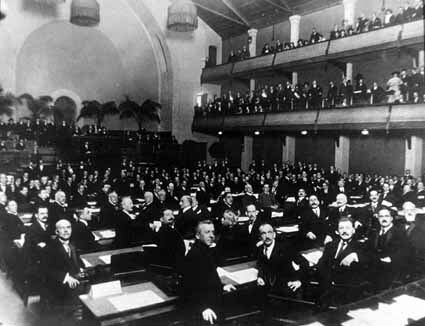 This organization for international cooperation was established at the end of the Great War.
This organization for international cooperation was established at the end of the Great War. This organization for international cooperation was established at the end of the Great War.
This organization for international cooperation was established at the end of the Great War.
The Leage Covenant embodied the principles of collective security (joint action by League members against an aggressor), arbitration of international disputes, reduction of armaments, and open diplomacy. It provided for a Permanent Court of International Justice and for a system whereby colonies in Asia and Africa would be distributed among the Allied Powers in the form of mandates.
During the 1920s the League, with its headquarters at Geneva, assimilated new members (neutral and enemy nations had been initially excluded) and helped settle minor international disputes. It was seriously weakened, however, by the nonadherence of the United States; the U.S. Congress failed to ratify the Treaty of Versailles (containing the Covenant).
One of the League's main purposes in preventing aggression was to preserve the status quo as established by the post-World War I peace treaties. In the 1930s, when dissatisfied nations (Japan, Italy, Germany) undertook to upset this arrangement and the other major powers declined to enforce it, the League, which had no power other than that of its member states, was unable to take action.
In 1946 it was replaced by the United Nations, which inherited many of its purposes and methods and much of its structure.